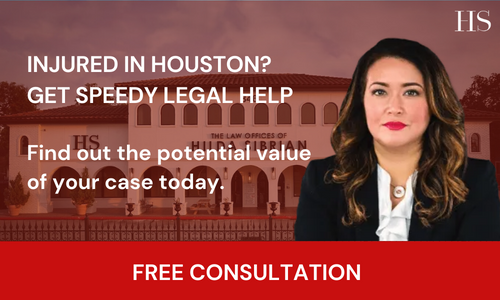Houstonians know that, in addition to being dangerous, our streets and freeways are also quite congested. But what many might not know is that we actually have many of the worst bottleneck freeways in the entire nation.
What are bottleneck freeways? Why are they a big deal?
Bottleneck freeways are major roads that cannot handle the normal flow of traffic due to inherent design flaws, leading to frequent, extreme traffic jams. For example, consider a three-lane highway that suddenly drops down to a single lane. Vehicles traveling on this highway must reduce their speed in order to merge, slowing down traffic behind it. The bottleneck occurs where the cars are merging; however, a bottleneck can slow down traffic for miles behind it.
Everyone has been stuck in a bottleneck at least once in their lives. While many people just grin and bear the delay, others become impatient and angry or use their phones to pass the time. Both of these behaviors increase the likelihood of a dangerous accident occurring.
What causes bottlenecks?
The most common causes of bottlenecks include:
- Design flaws (e.g., poorly timed traffic lights, roads that suddenly go from four to two lanes)
- Curvy roads (e.g., drivers must slow down for sharp curves)
- Merging onto or exiting the freeway
- Losing lanes on the freeway
While a bottleneck is usually the result of a physical condition such as those listed above, it can also result from things like car accidents or distracted driving.
However, Texas also has a few unique issues that contribute to bottlenecks. According to the American Trucking Association, freight trucks move 70 percent of our nation’s goods. Since Texas is a central hub in the nation’s supply chain, we see much of that traffic.
Texas also has several ports off the Gulf of Mexico that many companies use to ship goods through the Panama Canal. So it is also no surprise that Interstate 45, which connects Galveston to Dallas and runs straight through Houston, adds to that congestion.
With two major freeways cutting straight through Houston, it is no surprise that the city sees such an influx of freight truck traffic.
Does Houston have a bottleneck freeway problem?
Yes. And according to the American Transportation Research Institute (ATRI), it is a big one. Using data gathered from onboard communication systems in semi-trucks, ATRI studied traffic patterns from more than 600,000 heavy freight trucks traveling across the country. ATRI used vehicle position and speed to rank the top 100 bottleneck freeways in the country.
The ATRI found 14 of the country’s worst bottleneck freeways are in Texas. Houston leads the nation with 10 percent of the country’s worst bottleneck freeways.
The worst bottleneck freeways in Houston and their overall ranking are:
- 8th worst in the nation: I-45 at US 59 (average speed of 36 mph)
- 11th in the nation: I-10 at I-45 (average speed of 42 mph)
- 13th: I-10 at US 59 (average speed of 42 mph)
- 22nd: I-610 at US 290 (average speed of 42 mph)
- 25th: I-45 at I-610 (average speed of 46 mph)
- 33rd: I-10 at I-610 West (average speed of 46 mph)
- 59th: I-610 at US 59 West (average speed of 40 mph)
- 65th: I-45 at Sam Houston Tollway North (average speed of 49 mph)
- 82nd: I-45 at I-610 South (average speed of 46 mph)
- 88th: I-10 at I-610 East (average speed of 53 mph)
The worst bottleneck freeways in the rest of Texas include:
- 12th: Dallas, I-45 at I-30 (average speed of 38 mph)
- 60th: Dallas, US 75 at I-635 (average speed of 48 mph)
- 28th: Austin, I-35 (average speed of 31 mph)
- 49th: Fort Worth, I-35W at I-30 (average speed of 45 mph)
What can we do to lessen congestion?
The ultimate goal of ATRI’s study was to determine which freeways in our nation could use some help with bottlenecks. Since freight trucks are not going away anytime soon, we will continue to face traffic congestion. Carpool lanes and public transportation may not be enough to reduce commute times. Instead, our legislatures and city leaders need to renovate these problematic bottleneck areas.
ATRI hopes that its research can help government officials determine which roads and bridges need updating with federal and state funds. Whether that means adding a new lane or altering the paths or entrance/exit ramps, fixing what causes the bottlenecks will go a long way in reducing congestion. For Houston drivers, removing the bottleneck freeways could mean shorter, safer daily commutes.
For more information about Houston roadways, check out our blog. And, of course, if you or a loved one needs legal help after a car accident, contact The Law Offices of Hilda Sibrian™ at 713-714-1414 to schedule a free consultation.








